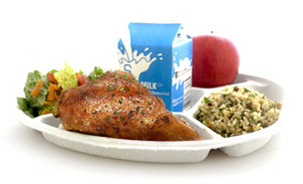Philadelphia, Baltimore Schools Replace Polystyrene Plates with Molded Fiber Compostables
![]() Print this Article | Send to Colleague
Print this Article | Send to Colleague
 The School District of Philadelphia, Pa., USA, and Baltimore,, Md., City Public Schools are the latest school districts in the Urban School Food Alliance to say goodbye to polystyrene serving items in schools for better environmental practices. Both Philadelphia and Baltimore have started the process of rolling out the use of compostable round plates designed by the Alliance in lunchrooms – with the two districts diverting 19 million polystyrene food service items from landfills.
The School District of Philadelphia, Pa., USA, and Baltimore,, Md., City Public Schools are the latest school districts in the Urban School Food Alliance to say goodbye to polystyrene serving items in schools for better environmental practices. Both Philadelphia and Baltimore have started the process of rolling out the use of compostable round plates designed by the Alliance in lunchrooms – with the two districts diverting 19 million polystyrene food service items from landfills."One of the reasons we joined the Urban School Food Alliance last fall was not only to be able to provide the best quality food for our students, but to also implement sound environmental practices," said Elizabeth Marchetta, executive director of the Food and Nutrition Department at Baltimore City Public Schools. "With more and more cities striving for zero waste, we wanted to become proactive in making a change for the betterment of our community."
The Urban School Food Alliance is a coalition of the largest school districts in the U.S. that includes New York, Los Angeles, Chicago, Miami, Dallas, Orange County in Orlando, Broward County in Fort Lauderdale, Clark County in Las Vegas, Philadelphia, Baltimore, and Boston. In 2014, the original six U.S. city members of the group (New York, Los Angeles, Chicago, Miami, Dallas, and Orange County) challenged industry to develop an innovative and affordable environmentally-friendly round plate to replace 225 million polystyrene trays across their six schools districts each year.
"Shifting from polystyrene trays to compostable plates helps reduce plastics pollution in our communities and oceans and begins to create valuable compost that can be re-used on our farms," said Margaret Brown, attorney with the Natural Resources Defense Council (NRDC), one of the nation's leading environmental and public health organizations and a non-profit partner of the Alliance. "This is also an important step for cities in beginning to slash significant amounts of waste going to overburdened landfills. The Urban School Food Alliance is helping Baltimore and Philadelphia make important changes that can be a model for schools across the country."
The Urban School Food Alliance serves nearly 3.7 million children daily, translating to more than 631 million meals a year. With an annual budget of $831 million in food and supplies, the nonprofit group allows the districts to share best practices and to leverage their purchasing power to continue to drive food quality up and costs down while incorporating sound environmental practices.
"As one of the smaller districts in the Alliance, we couldn't have afforded to purchase compostable plates on our own," said School District of Philadelphia SVP of Food Services Wayne T. Grasela. "This initiative aligns with GreenFutures, the district's overall sustainability plan and advances the District's work in reducing our environmental impact."
Schools across America use polystyrene trays because they cost less than compostable ones. Polystyrene trays average about $0.04 apiece, compared with its compostable counterpart, which averages about $0.12 each. Given the extremely tight budgets in school meal programs, affording compostable plates seemed impossible until the Urban School Food Alliance districts used their collective purchasing power to innovate a compostable round plate for schools at an affordable cost of about $0.05 each.
Philadelphia, which now uses the compostable plate, is meeting with student environmental clubs to help design a marketing campaign to get the word out about the new compostable plates and how they help preserve the environment. The district also plans a pilot program among its high schools to compost the plates.
Baltimore will roll out the plates over the next three months in the district. It currently has composting in a few middle schools and plans to pilot composting programs in other schools.
The American-made molded fiber compostable round plate is produced from 100% pre-consumer recycled paper fibers. It is manufactured in Maine by Huhtamaki North America. The Alliance round plate has five compartments, with the beverage compartment strategically placed in the middle to balance the weight of a typical meal. The innovative design prevents hinging or bending and is easy to handle.
The Urban School Food Alliance was created by school food professionals in 2012 to address the unique needs of the nation's largest school districts. The nonprofit group allows the districts to share best practices and leverage their purchasing power to continue to drive quality up and costs down while incorporating sound environmental practices. New York, Los Angeles, Chicago, Dallas, Miami-Dade, Orange County in Orlando, Broward County in Fort Lauderdale, Clark County in Las Vegas, Philadelphia, Baltimore and Boston together offer service in more than 5,600 schools to nearly 3.7 million children daily. This translates to more than 631 million meals a year. The coalition aims to ensure that all public school students across the nation receive healthy, nutritious meals through socially responsible practices.
To learn more about the Urban School Food Alliance or to support the group’s work, visit its web site.


